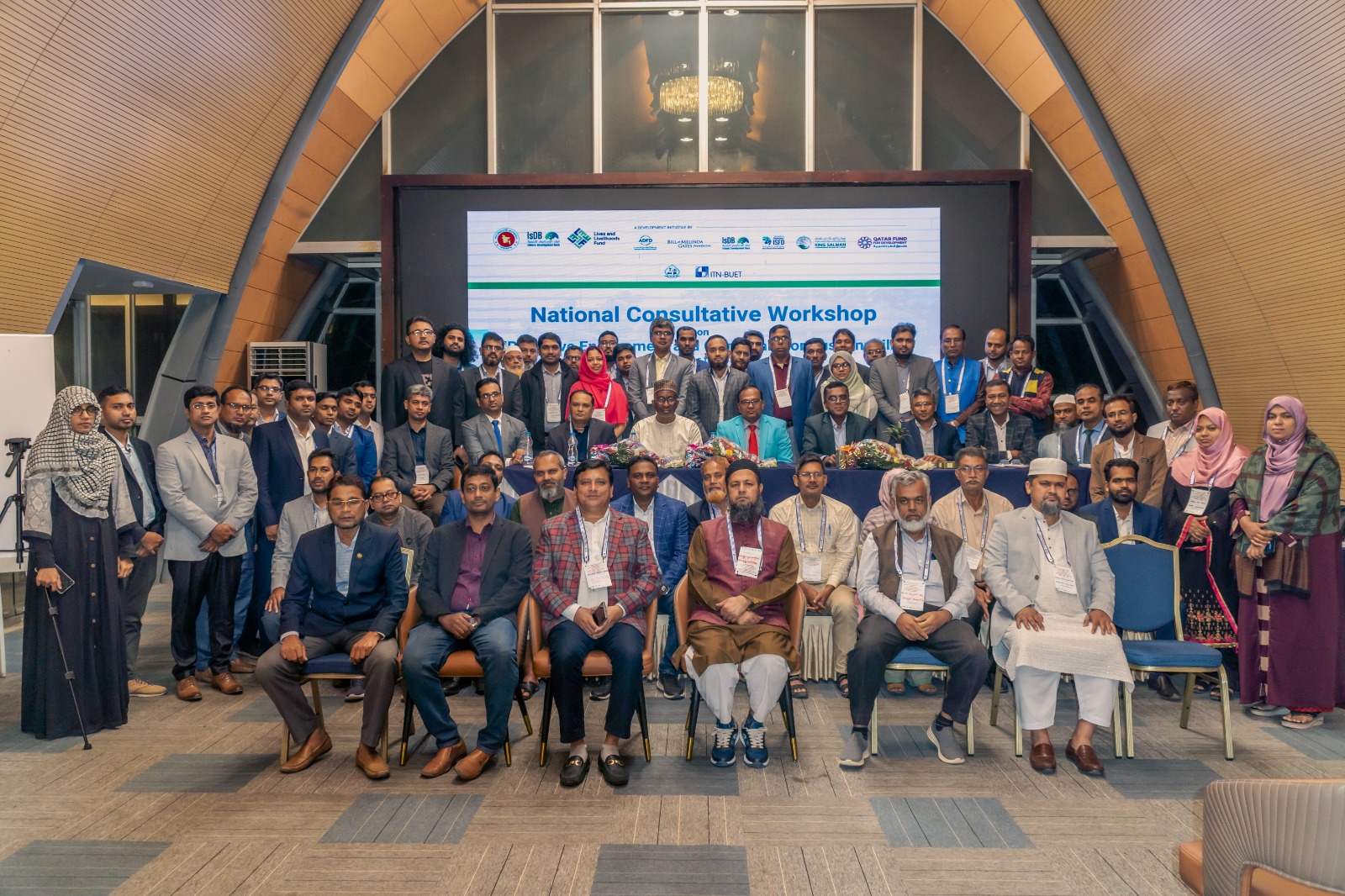

A groundbreaking three-day National Consultative Workshop on Proactive Engagement and Sustainability concluded at Gazipur, bringing together key stakeholders from public, private, and development sectors to advance sustainable and inclusive sanitation in Bangladesh. Organized under the BGD-1066 Inclusive and Integrated Sanitation and Hygiene Project, the event marked a significant step towards achieving climate-resilient sanitation services aligned with Sustainable Development Goal 6.2.
Titled as ‘National Consultative Workshop on Proactive Engagement and Ownership for Sustainability for the LLF-Funded Inclusive and Integrated Sanitation and Hygiene Project’ - hosted by the Department of Public Health Engineering (DPHE) with support from the Islamic Development Bank (IsDB), the Bill & Melinda Gates Foundation (BMGF), and other partners including ITN-BUET and the CWIS-FSM Support Cell, the workshop served as a platform for robust discussions and collaboration. It gathered senior government officials, municipality leaders from ten project towns, technical experts, and private sector representatives, aiming to align local and global sanitation priorities while ensuring inclusivity. High-level participants from nine Pourashavas ( Pabna, Narsingdi, Patuakhali, Shariatpur, Sirajganj, Lakshmipur, Jamalpur, Bagerhat Municipality), Cumilla city corporation, DPHE, and local administration attended, underscoring the workshop's importance.
The National Consultative Workshop on Proactive Engagement and Sustainability provided a comprehensive platform for addressing critical sanitation challenges in Bangladesh. Spanning three days, the event featured deep-dive sessions and expert-led discussions on key themes such as sanitation planning, service modeling, institutional frameworks, and private sector engagement. Esteemed speakers, including Chief Guest Md Fazlur Rahman, Additional Secretary of the Local Government Division, emphasized the pivotal role of accountability in ensuring the success of sanitation initiatives. Tushar Mohon Shadhu Khan, Chief Engineer of DPHE, highlighted the transformative power of well-planned sanitation and hygiene interventions, calling for collective commitment to ensure safe, sustainable, and inclusive services across all ten participating towns.
Special guests Nasser Mohammed Yakubu of IsDB and Dr. Roshan Raj Shrestha of BMGF provided insights into fostering inclusive and climate-resilient sanitation services. Contributions from Md Shafiqul Hassan, Co-Chair of the CWIS-FSM Support Cell, reiterated the need for proactive engagement and emphasized that sustainability must remain at the forefront of all efforts. As Rahman noted, “Without a sense of responsibility, even the most well-designed projects risk falling short of their potential.” These sentiments resonated with participants as they worked collaboratively to align with the vision of Sustainable Development Goal 6.2 and ensure equitable sanitation services for every citizen.
The workshop culminated in the development of a one-year action plan, focusing on overcoming existing challenges, fostering innovative partnerships, and enhancing capacity building. The initiative emphasized private sector involvement and robust institutional frameworks to drive long-term impact. Participants left the workshop with a clear roadmap and renewed commitment to advancing sustainable sanitation in Bangladesh, with collaboration and accountability as the guiding principles for success.
On the first day, the workshop opened with a ceremonial inauguration attended by representatives from the Department of Public Health Engineering (DPHE), the Islamic Development Bank (IsDB), and the Bill & Melinda Gates Foundation (BMGF). Keynote speakers highlighted the project’s achievements and challenges. Discussions focused on revisiting the current situation and identifying capacity gaps among service providers. Breakout group discussions emphasized improving coordination between DPHE and Pourashavas while addressing issues of accountability.
The second day centered on deep dives into sanitation planning, service modeling, and operational mechanisms. Experts presented innovative solutions for sanitation service delivery, with a particular focus on engaging private enterprises and ensuring the sustainability of operations and maintenance. Pourashava representatives engaged in group exercises to develop action-oriented plans for implementing sanitation interventions. Key takeaways included the need for robust institutional arrangements and the integration of climate-resilient strategies.
On the final day, participants focused on action planning and implementation strategies for the coming year. Sessions included discussions on institutional arrangements for IMIS (Integrated Management Information Systems) and refining project management setups for effective collaboration between DPHE and Pourashavas. The workshop concluded with a commitment to a one-year action plan, ensuring alignment with project goals and priorities. Distinguished guests expressed optimism,
The workshop concluded with a closing ceremony, where participants shared their key takeaways and reaffirmed their commitment to advancing sustainable and inclusive sanitation in Bangladesh. The facilitators summarized the collective vision for the future, while representatives from IsDB and BMGF pledged continued support for the initiative. In the closing ceremony, Nasser Mohammed Yakubu, Operations Team Leader at the Islamic Development Bank (IsDB), and Bipin Dongol, Senior Sanitation Expert, at the Islamic Development Bank (IsDB)., shared their insights and expressed hope that the workshop's outcomes would significantly impact the advancement of sustainable and inclusive sanitation in Bangladesh.As the workshop concluded, it left behind a roadmap for improved sanitation planning, actionable strategies for service modeling, and enhanced institutional mechanisms to ensure effective project implementation. The initiative is poised to directly benefit millions across the ten participating Pourashavas, fostering public health, environmental sustainability, and resilience within vulnerable communities.
This consultative effort stands as a testament to the collective commitment of stakeholders to revolutionize sanitation services in Bangladesh, ensuring they are sustainable, inclusive, and accessible to all.
